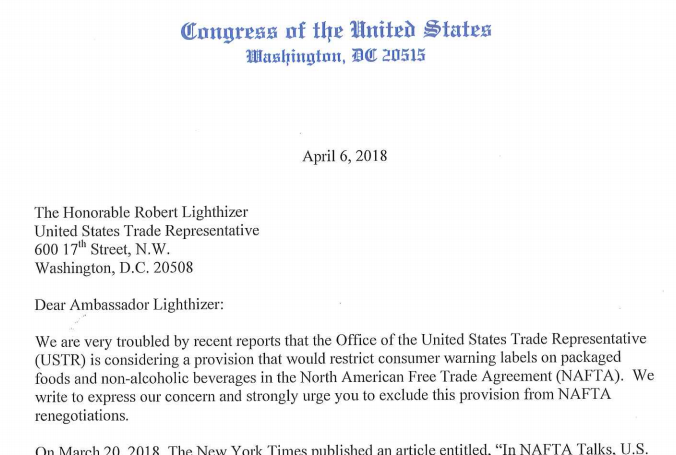Press Releases
Pingree Pushes to Protect Warnings on Food Products in NAFTA Negotiations
Washington, DC,
April 10, 2018
Tags:
Food and Agriculture
Congresswoman Chellie Pingree (D-ME) has led a letter to U.S. Trade Representative Robert Lighthizer pushing back against a proposal to restrict consumer warning labels on packaged foods and non-alcoholic beverages in the North American Free Trade Agreement (NAFTA) renegotiations.
Congresswoman Chellie Pingree (D-ME) has led a letter to U.S. Trade Representative Robert Lighthizer pushing back against a proposal to restrict consumer warning labels on packaged foods and non-alcoholic beverages in the North American Free Trade Agreement (NAFTA) renegotiations. At a Congressional hearing on March 21, 2018, Lighthizer confirmed reports that the Office of the U.S. Trade Representative is considering a provision that would limit labels sharing adverse health impacts of certain packaged foods and non-alcoholic beverages. Several trade partners are currently considering such labels to address rising rates of obesity in their countries. Trade agreement restrictions could stymie those countries’ efforts and eliminate future options for the United States to address its own rising rates of obesity. “It is inappropriate to use NAFTA to limit transparency in food products or stifle efforts to address the obesity epidemic. Combating obesity will likely require innovative policy tools, and we should not prevent our NAFTA counterparts from exploring all solutions,” Pingree and colleagues wrote. “Food labeling requirements, in particular, can lead to the availability of healthier options, because they often prompt manufacturers to change or reduce certain ingredients to improve the nutrition of food products.” The letter was also signed by Representatives Rosa DeLauro, James McGovern, Marcy Kaptur, Mark Pocan, Peter DeFazio, Earl Blumenauer, Carol Shea-Porter, Raúl Grijalva, David Cicilline, and Tim Ryan. Full text is below and the final signed letter is online here. April 6, 2018 Dear Ambassador Lighthizer: We are very troubled by recent reports that the Office of the United States Trade Representative (USTR) is considering a provision that would restrict consumer warning labels on packaged foods and non-alcoholic beverages in the North American Free Trade Agreement (NAFTA). We write to express our concern and strongly urge you to exclude this provision from NAFTA renegotiations. On March 20, 2018, The New York Times published an article entitled, “In NAFTA Talks, U.S. Tries to Limit Junk Food Warning Labels,” reporting that the USTR is pursuing a provision in NAFTA that would limit consumer warning labels on food and non-alcoholic beverages. On March 21, 2018, you testified at a House Ways and Means Tax Policy Subcommittee hearing and confirmed that such a provision is being advanced. We find this troubling in light of consumers’ growing expectation for transparency in our food system. Consumers increasingly demand the right to know what is in their food. Studies have shown that consumers find transparency in food products important and frequently base their food purchases off transparent content. Unfortunately, consumers also report being confused by conflicting information about what to eat and what to avoid. Empowering consumers with clear, easy-to-understand information can help them make more informed dietary decisions. After all, when consumers make choices about food, they are making choices about their health. As a result, transparency in food products is even more critical now as we try to curb rising obesity rates. According to a recent report by the Organization for Economic Co-operation and Development, 38%, 32%, and 25% of the population aged 15 and older are obese in the United States, Mexico and Canada, respectively. It is equally alarming that obesity rates are not projected to slow down in the coming years. The World Health Organization reported that the prevalence of obesity nearly tripled between 1975 and 2016. The consequences of obesity are devastating and costly, with some estimating the global economic impact of obesity reaches $2 trillion. Significant medical costs can accumulate when obesity leads to cardiovascular disease, type 2 diabetes, or cancer. Obesity also jeopardizes recruitment for military service, decreases work productivity, and can lead to premature death. Consequently, it is inappropriate to use NAFTA to limit transparency in food products or stifle efforts to address the obesity epidemic. Combating obesity will likely require innovative policy tools, and we should not prevent our NAFTA counterparts from exploring all solutions. Food labeling requirements, in particular, can lead to the availability of healthier options, because they often prompt manufacturers to change or reduce certain ingredients to improve the nutrition of food products. At the hearing on March 21, 2018, you said, “I’d like to put my office on the record as being against obesity.” We are glad that you share our concern about this global public health crisis, and we urge you to take the aforementioned provision off of the NAFTA negotiating table. Additionally, we respectfully request that you provide us with a summary of all provisions related to food labeling that the USTR is advancing in NAFTA renegotiations, as well as information about any provisions on the same topic that our NAFTA counterparts have put forth. We look forward to your response. |

